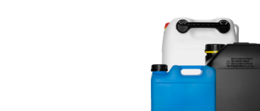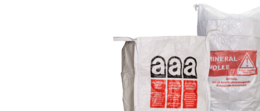Material Information
Polypropylene (PP)
is a versatile and cost-effective thermoplastic that is used in a wide range of applications due to its many beneficial properties. PP is characterized by its robustness, chemical resistance and ease of processing, making it an ideal material for packaging, textiles, automotive parts and many other products.
Production and properties of PP:
Polypropylene (PP) is produced through the polymerization of the monomer propene, utilizing catalysts in a high-temperature and high-pressure environment within polymerization reactors. This process yields a polymer that is subsequently transformed into granules or powder form. These granules or powder are then manufactured into various plastic products, including films, pipes, and containers. PP possesses characteristics akin to hard polyethylene (HDPE) and low-pressure polyethylene (LDPE), yet it distinguishes itself by being less dense, stiffer, harder, and more heat-resistant. Notably the most rigid among polyolefin polymers, PP maintains its properties even at temperatures exceeding 100°C. It exhibits remarkable resistance to abrasion and heat, boasts superior dielectric properties, functions efficiently as an insulator, and demonstrates exceptional fatigue bending strength, enduring up to 10 million bends. PP can withstand temperatures up to 140°C for brief durations but becomes brittle at temperatures below 0°C. It is not biodegradable. In terms of toxicity and environmental impact, especially during production and disposal processes like incineration or landfill, PP is considered significantly less problematic compared to other plastics like PVC and polystyrene.
Applications:
Polypropylene (PP) has found a wide range of applications in various industries due to its versatile properties:
- Paints and varnishes: PP is used to produce packaging for paints and varnishes, as it is resistant to chemicals and insensitive to solvents. In addition, PP fibers are used as reinforcement in water-based paints and varnishes.
- Chemical products: In the chemical industry, PP is used for storage and transportation containers for chemicals, laboratory equipment and piping systems due to its high chemical resistance.
- Food and beverages: PP is widely used in the food industry for packaging such as bottles, cups, trays and films, as it is odorless and tasteless and complies with EU directives for food contact.
- Pharmaceutical products: PP is used to manufacture medical packaging, syringes, medicine containers and laboratory equipment as it is sterilizable, chemical resistant and biocompatible.
- Building materials, production and trade: PP is used in the construction industry for pipes, geotextiles, insulating materials and plastic screws. Its resistance to moisture and chemicals as well as its mechanical strength make it an ideal material for these applications.
- Disposal/recycling: Polypropylene is easily recyclable and is often used for waste and recycling containers, garbage bags and sorting systems. Its durability and resilience help to extend the life cycle of products and reduce environmental impact.
- Oils and lubricants: PP is used in the manufacture of containers and packaging for oils and lubricants as it is resistant to oils, greases and aggressive chemicals.
- Cosmetic products: In the cosmetics industry, PP is used for the packaging of creams, lotions, shampoos and other liquids. The chemical resistance of PP allows these products to be stored safely without any loss of quality or performance. PP is also used for the production of cosmetic brushes and applicators.
Advantages:
- Low weight: Polypropylene has a low density and is therefore a lightweight material.
- Chemical resistance: Polypropylene is resistant to many chemicals, making it an ideal material for applications in the chemical and pharmaceutical industries.
- Good electrical properties: Polypropylene has good electrical properties, making it an ideal material for electrical applications.
- Recyclability: Polypropylene can be recycled, which helps to reduce the environmental impact.
Overall, polypropylene is a popular material in the packaging industry due to its excellent properties such as chemical resistance, strength and low weight. It is used in a wide range of applications, e.g. for flexible packaging, bottles and containers, lids and closures as well as trays and bowls.








